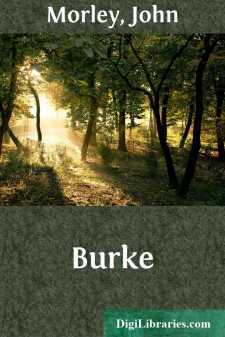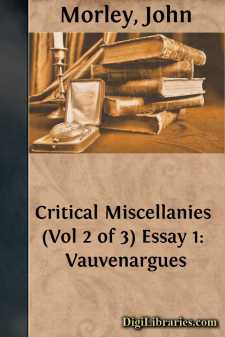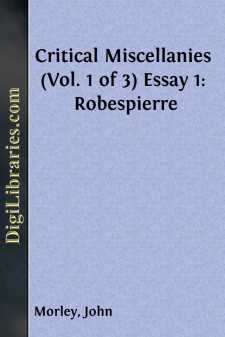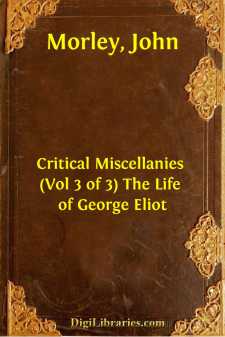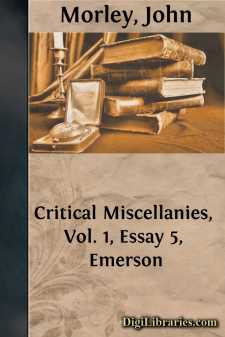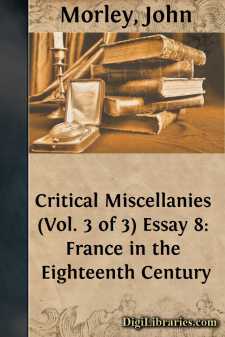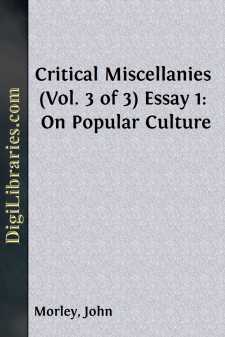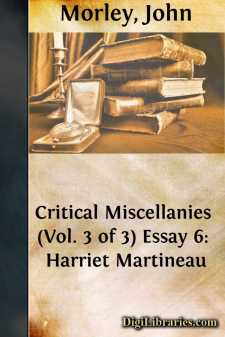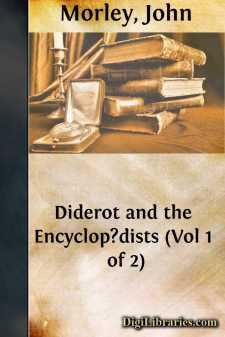Categories
- Antiques & Collectibles 13
- Architecture 36
- Art 48
- Bibles 22
- Biography & Autobiography 813
- Body, Mind & Spirit 142
- Business & Economics 28
- Children's Books 15
- Children's Fiction 12
- Computers 4
- Cooking 94
- Crafts & Hobbies 4
- Drama 346
- Education 46
- Family & Relationships 57
- Fiction 11828
- Games 19
- Gardening 17
- Health & Fitness 34
- History 1377
- House & Home 1
- Humor 147
- Juvenile Fiction 1873
- Juvenile Nonfiction 202
- Language Arts & Disciplines 88
- Law 16
- Literary Collections 686
- Literary Criticism 179
- Mathematics 13
- Medical 41
- Music 40
- Nature 179
- Non-Classifiable 1768
- Performing Arts 7
- Periodicals 1453
- Philosophy 64
- Photography 2
- Poetry 896
- Political Science 203
- Psychology 42
- Reference 154
- Religion 513
- Science 126
- Self-Help 84
- Social Science 81
- Sports & Recreation 34
- Study Aids 3
- Technology & Engineering 59
- Transportation 23
- Travel 463
- True Crime 29
Sort by:
by:
John Morley
CHAPTER I EARLY LIFE, AND FIRST WRITINGS It will soon be a hundred and twenty years since Burke first took his seat, in the House of Commons, and it is eighty-five years since his voice ceased to be heard there. Since his death, as during his life, opinion as to the place to which he is entitled among the eminent men of his country has touched every extreme. Tories have extolled him as the saviour of...
more...
by:
John Morley
BYRON. It is one of the singular facts in the history of literature, that the most rootedly conservative country in Europe should have produced the poet of the Revolution. Nowhere is the antipathy to principles and ideas so profound, nor the addiction to moderate compromise so inveterate, nor the reluctance to advance away from the past so unconquerable, as in England; and nowhere in England is there...
more...
by:
John Morley
VAUVENARGUES. One of the most important phases of French thought in the great century of its illumination is only thoroughly intelligible, on condition that in studying it we keep constantly in mind the eloquence, force, and genius of Pascal. He was the greatest and most influential representative of that way of viewing human nature and its circumstances, which it was one of the characteristic glories...
more...
by:
John Morley
A French writer has recently published a careful and interesting volume on the famous events which ended in the overthrow of Robespierre and the close of the Reign of Terror. These events are known in the historic calendar as the Revolution of Thermidor in the Year II. After the fall of the monarchy, the Convention decided that the year should begin with the autumnal equinox, and that the enumeration...
more...
by:
John Morley
THE LIFE OF GEORGE ELIOT. The illustrious woman who is the subject of these volumes makes a remark to her publisher which is at least as relevant now as it was then. Can nothing be done, she asks, by dispassionate criticism towards the reform of our national habits in the matter of literary biography? 'Is it anything short of odious that as soon as a man is dead his desk should be raked, and every...
more...
by:
John Morley
Ralph Waldo Emerson was born at Boston, May 25, 1803. He was of an ancient and honourable English stock, who had transplanted themselves, on one side from Cheshire and Bedfordshire, and on the other from Durham and York, a hundred and seventy years before. For seven or eight generations in a direct and unbroken line his forefathers had been preachers and divines, not without eminence in the Puritan...
more...
by:
John Morley
FRANCE IN THE EIGHTEENTH The announcement that one of the most ingenious and accomplished men of letters in Europe was engaged upon a history of the French Revolution, raised some doubts among those who have thought most about the qualifications proper to the historian. M. Taine has the quality of the best type of a man of letters; he has the fine critical aptitude for seizing the secret of an...
more...
by:
John Morley
The proceedings which have now been brought satisfactorily to an end are of a kind which nobody who has sensibility as well as sense can take a part in without some emotion. An illustrious French philosopher who happened to be an examiner of candidates for admission to the Polytechnic School, once confessed that, when a youth came before him eager to do his best, competently taught, and of an apt...
more...
by:
John Morley
HARRIET MARTINEAU. In 1850 Charlotte Brontë paid a visit to Harriet Martineau at Ambleside, and she wrote to her friends various emphatic accounts of her hostess. 'Without adopting her theories,' Miss Brontë said, 'I yet find a worth and greatness in herself, and a consistency, benevolence, perseverance in her practice, such as wins the sincerest esteem and affection. She is not a...
more...
by:
John Morley
There was a moment in the last century when the Gallican church hoped for a return of internal union and prosperity. This brief era of hope coincided almost exactly with the middle of the century. Voltaire was in exile at Berlin. The author of the Persian Letters and the Spirit of Laws was old and near his end. Rousseau was copying music in a garret. The Encyclopædia was looked for, but only as a...
more...


